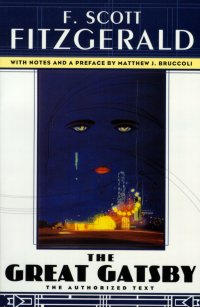Review: The Great Gatsby

- Title
- The Great Gatsby
- Author
- F. Scott Fitzgerald
- Publisher
- Simon & Schuster Inc., 1995
- ISBN
- 0-684-80152-3
Review Copyright © 1998 Garret Wilson — February 12, 1998, 3:30pm
Magnificent.
The Great Gatsby is the story of a man with a dream, the self-made dream of a self-made man. F. Scott Fitzgerald tells the story of James Gatz, the man who transformed himself into Jay Gatsby and attempted to create a physical reality modeled on the dreams he had already created and had already to himself become real. A dream that was so real it was always present, yet so grand that it was unattainable.
Gatsby is a man that has an idealistic dream that consumes his entire existence. He recreates himself and his life in order to effect that dream, yet somehow misses something — life, the point — something that was kept hidden by a dream that in the end was only a dream in a very literal sense of the word.
The narrator, Nick Carraway, is in some senses another aspect of Gatsby himself. Some of the few passages which give us an insight into Nick’s psyche seem to reflect bits of Gatsby: "And I had the high intention of reading many other books besides... now I was going to bring back all such things into my life and become again that most limited of all specialists, the "well-rounded" man," ending with the ironic, "life is much more successfully looked at from a single window, after all" (8-9).
This is the first Fitzgerald novel that I have read, and immediately I fell in love with his prose. Descriptions are concise and witty. While some authors spend paragraphs giving glamorous, detailed descriptions of items and events, Fitzgerald manages to convey the feeling in just a few image-evoking words. He describes events in perfect phrases that have been carefully constructed and reflect his habit of meticulously revising and perfecting his works.
I had barely started the novel when I was hooked by such descriptions that I would have gladly read an account about nothing at all, as long as it had been created by Fitzgerald. His descriptions make one wish that the book were a pillow or a close friend, so that you could snuggle up beside it and feel it against you. Indeed, in the first few pages one encounters such wonderful accounts as:
The younger of the two was a stranger to me. She was extended full length at her end of the divan, completely motionless and with her chin raised a little as if she were balancing something on it which was quite likely to fall... [the narrator is introduced to the two women, one of whom is Jordan Baker]... At any rate Miss Baker’s lips fluttered, she nodded at me almost imperceptibly and then quickly tipped her head back again — the object she was balancing had obviously tottered a little and given her something of a fright (13).
This delightful reading continues in the next few pages and throughout the book:
Before I could reply that he was my neighbor dinner was announced; wedging his tense arm imperatively under mine Tom Buchanan compelled me from the room as though he were moving a checker to another square (16).
Fitzgerald is wonderful at telling a story without actually telling the story in so many words. The second chapter is an example of this, when one sees Nick Carraway quite evidently getting drunk at a party. While the actual words do not overly stress this fact, the scene that unfolds through the narrator’s eyes bring this fact out quite vividly.
Gatsby is about dreams, ambitions, and what we become when trying to reach them. This is made most evident when Gatsby’s father arrives and begins telling us about the real Gatsby, not the Gatsby with hundreds of friends at his parties, not the Gatsby who lived a multitude of very real adventures, not the "Oxford man," but a father’s "Jimmy." Here we suddenly see what drove the great Gatsby, what made him tick. And it is at this point that we hear his father utter what my be the most ironic words in the work: "If he’d of lived he’d of been a great man" (176).
Recommended reading.
Copyright © 1998 Garret Wilson